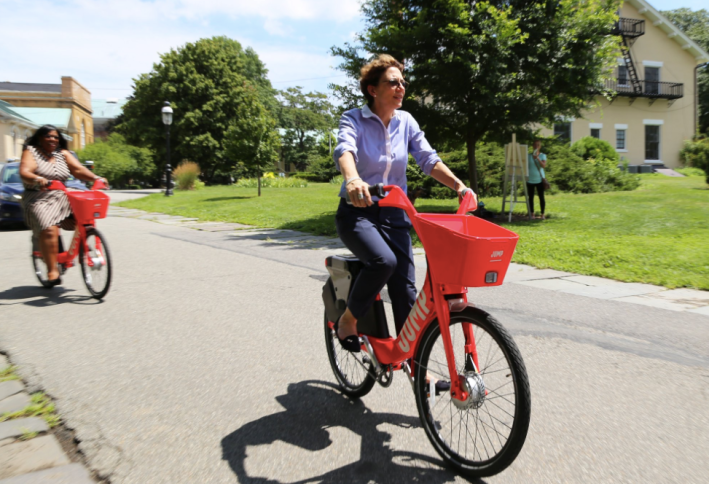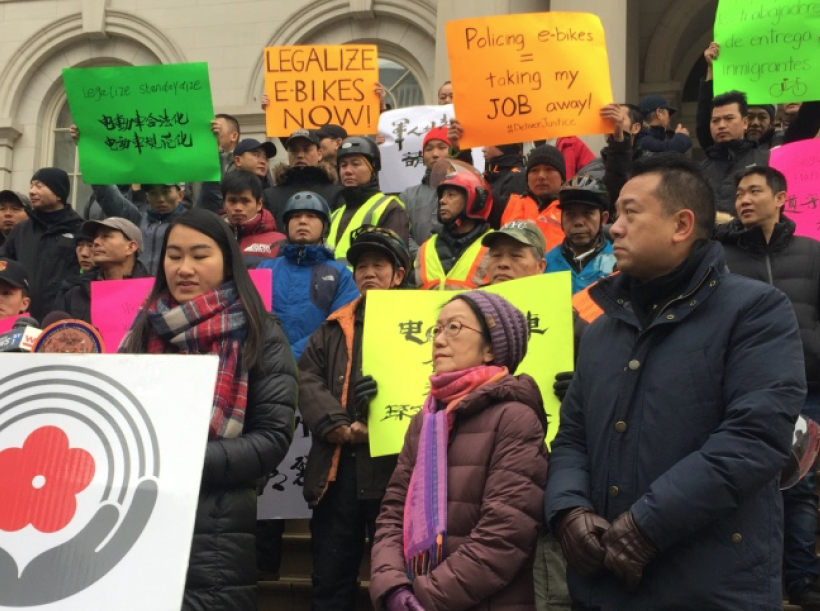For Council Member Margaret Chin, Mayor de Blasio's crackdown on e-bike delivery workers, announced last October, was hardly the first time she'd heard about the challenges facing delivery workers who use electric bicycle to do their jobs.
In fact, Chin became aware of the heavy policing endured by immigrant delivery workers around four years ago, when workers began coming to her office regarding tickets they'd received while doing their jobs. Naturally, then, she was the first council member to stand alongside delivery workers in their opposition to the crackdown. She's continued the fight since, testifying to DOT in May in favor of e-bike rules that would allow workers to convert their bikes from throttle-powered to pedal-assist.
Streetsblog spoke to Chin last week about the ongoing fight for the dignity of the thousands of workers who delivery food to New Yorkers by electric bike. This interview has been edited for length and clarity.
How did you become aware of the e-bike issue?
Delivery workers coming to our office with tickets. This was even a couple of years back, in 2014. People were getting their bike confiscated. We were helping them fight their tickets and get their bike back.
A lot of them were between the age of 40 and 60, and they work really long hours. Sometimes they have to bike up like 30 city blocks for one delivery; It’s not like delivering around the corner, or whatever. It has become further and further away. A lot of them don’t speak English well, and they don’t know the state and city regulations on these e-bikes. But they’re available to buy, so for them, especially the older workers, in order for them to make the delivery quickly — because the customer wants their food fast and hot — and in order for them to maybe get a better tip, they’ve got to make sure they deliver quickly as possible.
But more and more they’re getting tickets. It’s just so sad — when their bike gets confiscated, that’s their livelihood. Sometimes the tickets are very very expensive, like $500. You know, that’s more than their salary for the week.
Why was there an increase in 2014?
We asked, "Why are people using e-bikes?" And it turns out that, hey, there are more and more further deliveries. And then also there’s a lot of laws that have been passed, like, that delivery workers have to wear uniforms that show the restaurants where they work, and they have to wear helmets and things like the that. But also, even though the city is supposed to crack down on the businesses, oftentimes, the tickets are given to the workers, especially if they were using e-bikes.
What do you hear from the workers?
We asked them [through surveys], if they were interested in the possibility of getting licenses and insurance. A lot of them were interested in that. But that means that we need to get the state to legalize the electric bicycles. But this is going on not just in the Asian community. This is happening across the city. There are other delivery workers, latino and African immigrants — it’s really affecting the immigrant community, and many of them are doing this delivery work to survive and support their families.
It seems that you’re the only Manhattan council member sticking her neck out for delivery workers. Your colleagues say they get complaints about them, and typically respond by encouraging more police enforcement. What’s the sentiment on the City Council about this issue and why have you chosen to stand by delivery workers?
We’re not avoiding the question of safety. We all want Vision Zero safety. That’s why in the past we have pushed for safety for delivery workers, with helmets and making sure they’re safe on the road and they should follow traffic rules. Nobody’s against that. But in terms of all the crackdowns, the delivery workers are telling us [that] a lot of time they cannot negotiate because their English is not that good. And if a cop stops them and gives them a ticket, they can’t fight against it. They can’t say, “Wait a minute I didn’t run a red light,” or “I didn’t break the law.” The cops just write them a ticket. Sometimes, they confiscate their bike, and it’s very difficult for them to get it back. It takes a lot of time and they lose their livelihood for that week.

There are more and more council members that are supportive, from all over the city, because it’s not just happening in Manhattan. So we’re all trying to work together to make sure that, yes, traffic safety needs to be followed, but at the same time, we want to make sure these immigrant workers can survive and make a living — because they need to feed their families.
How should the city be handling this challenge?
DOT put forth this rule change, but it did not address the real issues. It seems like all of a sudden the city wants to promote these pedal-assist electric bicycles [like] Citi Bike. They want to promote those ... so all of a sudden, now, the city is looking at the issue. Great! But that doesn't affect delivery workers, because they use [throttle-controlled] electric bikes. We’re asking the city and the mayor: Help these workers legalize their electric bikes, help them convert it, and promote a public education campaign in [multiple] languages on how they can convert their bikes. This way, they can continue to work and make a living. Until we can get the law passed in Albany to legalize all electric bikes, right now we have to deal with what we have.
Do you want the mayor to call off his crackdown?
They should definitely provide a grace period to allow the delivery workers to convert their bikes. Look, if a delivery worker is running a red light, they should definitely get a ticket. If they are violating traffic rules, if they’re going in the wrong direction, they should get ticketed. Those kinds of enforcement should be done, but they should not be confiscating their electric bikes and taking away their livelihood.






